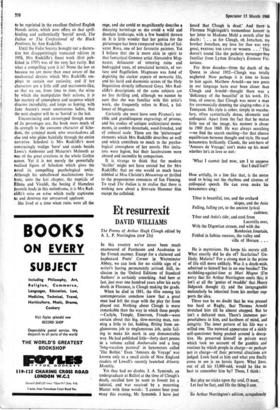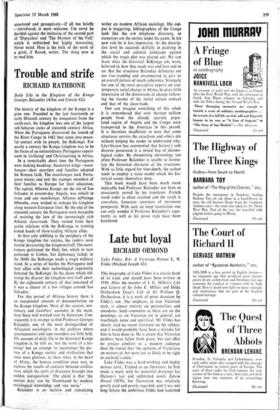Et resurrexit
DAVID WILLIAMS
The Poems of Arthur Hugh Clough edited by A. L. P. Norrington (ouP 21s) In this country we've never been much enamoured of Pantheons and Academies in the French manner. Except for a cluttered and haphazard Poets' Corner in Westminster Abbey, we can look for no visible sign of a writer's having permanently arrived. Still, in- clusion in the 'Oxford Editions of Standard Authors' is certainly something. And here at last, just over one hundred years after his early death in Florence, is Clough making the grade.
When he died in 1861, the elite among his contemporaries somehow knew that a great man had left the stage with the play far from played out. Nothing about Clough is more remarkable than the way in which these people —Carlyle, Temple, Emerson, Froude—were certain about this big, slow-moving man, run- ning a little to fat, balding, flitting from un- glamorous job to unglamorous job, quite fail- ing to make his mark in any demonstrable way. He had published little—forty short poems in a volume called Antbarvalia and a long 'long-vacation pastoral' in hexameters called 'The Bothie.' Even 'Amours de Voyage' was known only to a small circle of New England readers of Lowell's recently launched Atlantic Monthly.
Yet they had no doubts. J. A. Symonds, an undergraduate at Balliol at the time of Clough's death, recalled how he went to Jowett for a tutorial, and was received by a mourning Master with these words: 'I cannot hear your essay this evening, Mr Symonds. I have just heard that Clough is dead.' And there' is Florence Nightingale's tremendous lament in her letter to Madame Mohl a month after his
death: . . as for Clough, oh Jonathan, my brother Jonathan, my love for thee was very great, PASSING THE LOVE OF WOMEN. . . This doesn't sound like the pathetic messenger-boy familiar from Lytton Strachey's Eminent Vic- torians.
For three decades—from the death of the Queen to about 1932—Clough was totally neglected. Now perhaps it is time to listen to him again. Matthew Arnold—no two poets in our language have ever been closer than Clough and Arnold—thought there was a 'deficiency of the beautiful' in his work. It's true, of course, that Clough was never a man for ceremonially donning the singing-robes a la Tennyson. His style is sober, simple in vocabu- lary, often syntactically dense, idiomatic and colloquial. Apart from the fact that he makes little use of the image, his manner is closer to 1960 than 1860. He was always searching —we find the search exciting—for that elusive equilibrium between thought and style. He used hexameters brilliantly. Claude, the anti-hero of 'Amours de Voyage,' can't make up his mind whether he's in love or not:
'What I cannot feel now, am I to suppose that I shall feel?'
How artfully, in a line like that, is the metre used to bring out the rhythms and stresses, of colloquial speech. He can even make his hexameters sing: Tibur is beautiful, too, and the orchard slopes, and the Anio Falling, falling yet, to the ancient lyrical cadence; Tibur and Anio's tide; and cool from Lucretilis ever, With the Digentian stream, and with the Bandusian fountain, Folded in Sabine recesses, the valley and villa of Horace. . . .
He is mysterious. He keeps his secrets still. What exactly did he die of? Scarlatina? Un- likely. Malaria? For a strong man in the prime of life still more unlikely. Was it a death-wish, admitted to himself but to no one besides? The scribbling-against-time at Mari Magno (I'm sorry that Sir Arthur Norrington omits this; it isn't at all the 'genius of twaddle' that Henry Sidgwick thought it), and the inexpugnable melancholy he inherited from his mother sup- ports the idea.
There can be no doubt that he was pressed too hard at Rugby, that Thomas Arnold stretched him till he almost snapped. But he isn't a defeated man. There's immense pur- posefulness in him, and hardness of mind, and integrity. The inner pattern of his life was a willed one. The outward appearance of a sickly self-questioner being pushed around is decep- tive. He preserved himself in private ways which took no account of the gambits and routines by which people in charge—or perhaps not in charge—of their personal situations are judged. Look hard at him and what you finally come to see is an heroic figure. What lines, out of all his 13,000-odd, would he like us best to remember him by? These, I think : But play no tricks upon thy soul, 0 man; Let fact be fact, and life the thing it can.
Sir Arthur Norrington's edition, scrupulously
annotated and perceptively—jf all too. briefly —introduced, is most welcome. I'm sorry be decided against the inclusion of the second part of 'Dipsychus' and 'The Mystery of the Fall,' which is unfinished but highly interesting. Never mind. Here is the bulk of the work of a great, if flawed, writer. The thing now is to read him.











































 Previous page
Previous page